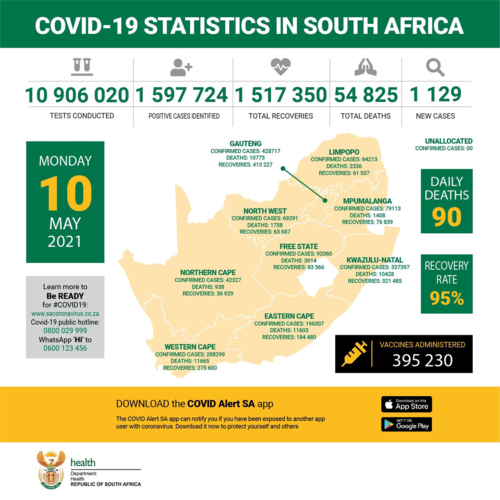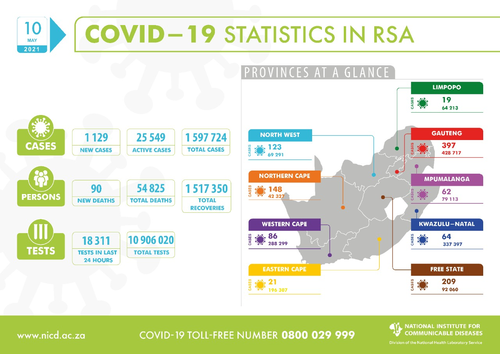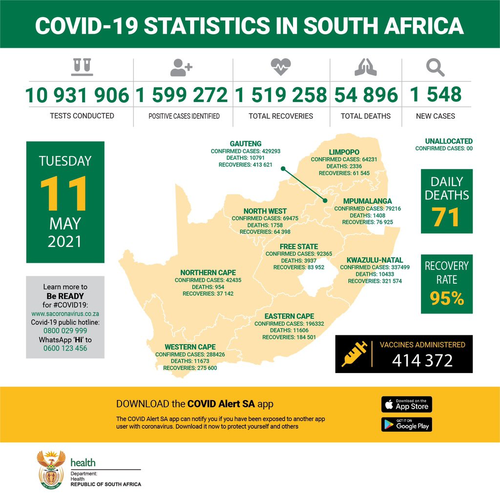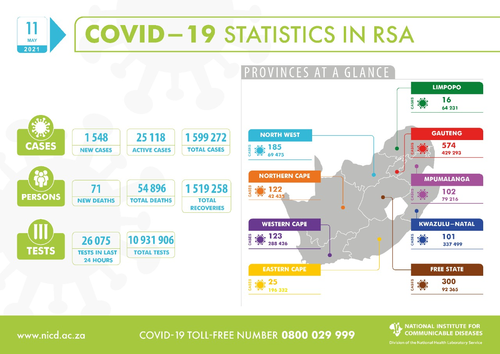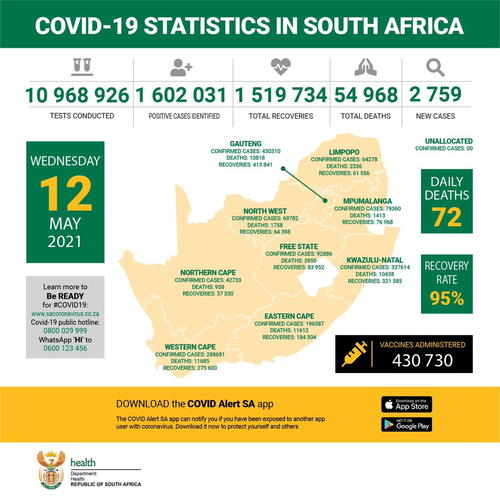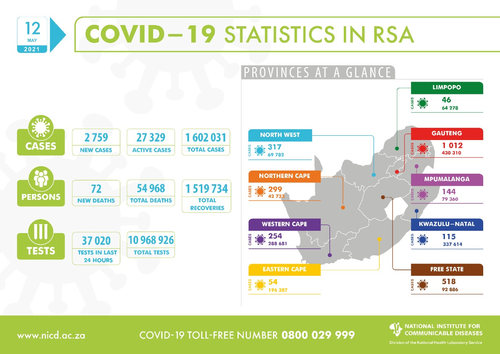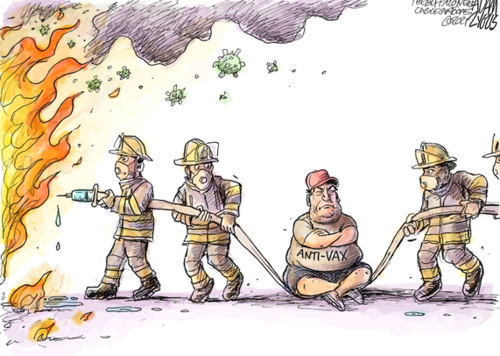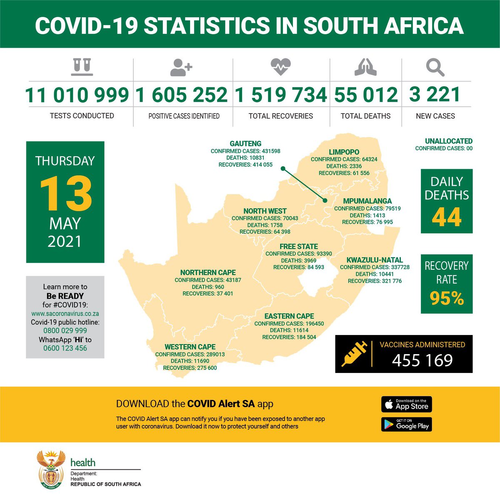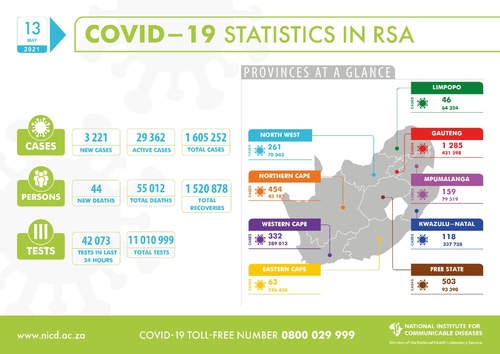Navigation
Install the app
How to install the app on iOS
Follow along with the video below to see how to install our site as a web app on your home screen.

Note: this_feature_currently_requires_accessing_site_using_safari
More options
You are using an out of date browser. It may not display this or other websites correctly.
You should upgrade or use an alternative browser.
You should upgrade or use an alternative browser.
Lockdown diaries - COVID-19 matters!
- Thread starter Grand Guru
- Start date
-
- Tags
- lockdown
South Africans head to Zimbabwe for COVID-19 vaccinations
https://www.capetownetc.com/news/south-africans-head-to-zimbabwe-for-covid-19-vaccinations
10 May 2021
"While many African countries are still struggling with their COVID-19 vaccine rollout plans, South Africans are allegedly heading to Zimbabwe for theirs. It is alleged that Zimbabwe has recently seen an increase in foreign nationals, with many streaming into their country to get vaccinated against the deadly Coronavirus, for a fee.
According to Times Live, Zimbabwean President Emmerson Mnangagwa indicated about a month ago that foreigners could get the injection in his country if they are willing to pay the price. Zimbabwe has allegedly approved the use of four Covid-19 vaccines; China’s Sinopharm, Sinovac vaccines, Russia’s Sputnik V and Covaxin from India. Sinopharm and Sinovac’s vaccines are the bulk of the vaccines distributed in Zimbabwe.
It is alleged that 478 174 Zimbabweans have received their injections already. Meanwhile, South African has only vaccinated less than 0.6% of its population to date..."
https://www.capetownetc.com/news/south-africans-head-to-zimbabwe-for-covid-19-vaccinations
10 May 2021
"While many African countries are still struggling with their COVID-19 vaccine rollout plans, South Africans are allegedly heading to Zimbabwe for theirs. It is alleged that Zimbabwe has recently seen an increase in foreign nationals, with many streaming into their country to get vaccinated against the deadly Coronavirus, for a fee.
According to Times Live, Zimbabwean President Emmerson Mnangagwa indicated about a month ago that foreigners could get the injection in his country if they are willing to pay the price. Zimbabwe has allegedly approved the use of four Covid-19 vaccines; China’s Sinopharm, Sinovac vaccines, Russia’s Sputnik V and Covaxin from India. Sinopharm and Sinovac’s vaccines are the bulk of the vaccines distributed in Zimbabwe.
It is alleged that 478 174 Zimbabweans have received their injections already. Meanwhile, South African has only vaccinated less than 0.6% of its population to date..."
Argentina confirms first cases of Covid-19 variants from India, South Africa
https://www.timeslive.co.za/news/wo...of-covid-19-variants-from-india-south-africa/
11 May 2021
"Argentina's Health Ministry on Monday confirmed its first cases of the more contagious Covid-19 variants discovered in India and South Africa in three travelers returning to the South American country from Europe.
The Indian variant of the coronavirus was detected in two minors who returned from Paris, while the South African variant was found in a 58-year-old passenger returning from Spain, the ministry said in a statement..."
https://www.timeslive.co.za/news/wo...of-covid-19-variants-from-india-south-africa/
11 May 2021
"Argentina's Health Ministry on Monday confirmed its first cases of the more contagious Covid-19 variants discovered in India and South Africa in three travelers returning to the South American country from Europe.
The Indian variant of the coronavirus was detected in two minors who returned from Paris, while the South African variant was found in a 58-year-old passenger returning from Spain, the ministry said in a statement..."
SA remains on the UK’s ‘red list’ of banned travel – but British Airways eyes June return
https://www.businessinsider.co.za/s...l-but-british-airways-eyes-june-return-2021-5
11 May 2021
https://www.businessinsider.co.za/s...l-but-british-airways-eyes-june-return-2021-5
11 May 2021
- The United Kingdom has created a "green list" which allows travellers from 12 low-risk countries to enter without needing to quarantine.
- South Africa remains on the red list, which only allows for residents and citizens to return to the UK – with a mandatory ten-day quarantine in a state-managed hotel.
- While leisure travel to countries on the amber list is strongly discouraged, returning travellers will be allowed to quarantine at home.
- Despite South African travellers being banned, British Airways is set to resume flights to and from London in June, with tickets already on sale.
Japan's Olympics protests intensify as Covid-19 spreads without vaccines
https://www.businessinsider.co.za/j...pic-games-as-covid-spreads-no-vaccines-2021-5
10 May 2021
"Japan is now racking up Covid-19 infections like never before. Less than 1% of the population has been vaccinated, new, more contagious variants have arrived on the scene, and people are tired after more than a year of extreme caution.
The situation is so dire that a state of emergency in Tokyo has been extended until the end of May to combat the spread of the virus.
Still, Japanese leaders maintain the games must go on...
Overwhelmingly, Japanese people vehemently disagree with that sentiment. Over 70% of the country thinks the 2020 Summer Olympics, which were originally scheduled for last year, should either be postponed yet again due to the pandemic, or cancelled entirely, according to a recent Kyodo News poll.
An online petition to cancel the Olympics, which went live last Wednesday, has so far garnered more than 310,000 signatures...
Japan has now logged more coronavirus deaths in the first four months of 2021 than it did in all of 2020, and a snail's pace vaccination campaign in the country is souring public sentiment."
https://www.businessinsider.co.za/j...pic-games-as-covid-spreads-no-vaccines-2021-5
10 May 2021
"Japan is now racking up Covid-19 infections like never before. Less than 1% of the population has been vaccinated, new, more contagious variants have arrived on the scene, and people are tired after more than a year of extreme caution.
The situation is so dire that a state of emergency in Tokyo has been extended until the end of May to combat the spread of the virus.
Still, Japanese leaders maintain the games must go on...
Overwhelmingly, Japanese people vehemently disagree with that sentiment. Over 70% of the country thinks the 2020 Summer Olympics, which were originally scheduled for last year, should either be postponed yet again due to the pandemic, or cancelled entirely, according to a recent Kyodo News poll.
An online petition to cancel the Olympics, which went live last Wednesday, has so far garnered more than 310,000 signatures...
Japan has now logged more coronavirus deaths in the first four months of 2021 than it did in all of 2020, and a snail's pace vaccination campaign in the country is souring public sentiment."
India's Covid-19 catastrophe could make global shortages even worse
https://edition.cnn.com/2021/05/10/business/india-covid-industries-intl-hnk/index.html
11 May 2021
"... Should the crisis deepen, everything from clothing and pharmaceuticals to financial services and global shipping could feel the pain.
Supply chains
About 80% of world goods trade by volume is carried on ships, according to the United Nations World Conference on Trade and Development, and India provides many of their crews.
More than 200,000 of an estimated 1.7 million seafarers globally are from India, according to Guy Platten, the Secretary General at the International Chamber of Shipping. Many of them have officer ranks and roles requiring important skills, he added.
"We hope to goodness" this situation can be resolved, Platten told CNN Business. Otherwise it could lead to big "shortage of seafarers," which would "disrupt the global supply chain," he added.
As many countries have banned flights from India, it is already impossible to move Indian workers to ports around the world, and swap crews.
René Piil Pedersen, head of Marine Relations at Maersk, the world's largest container shipping company, hopes that countries start distinguishing between regular travelers and seafarers. Otherwise, he said, the world could face both a serious threat to global cargo flows, and a "humanitarian crisis," because crews would not be able to leave their vessels and return home...
There are also significant delays in the movements of vessels. Some places, such as the United Arab Emirates, Singapore, Hong Kong and mainland China, "have already imposed strict quarantine restrictions for vessels arriving from Indian ports," said Sankar Narayanan, manager for shipping at shipping and logistics company GAC India.
Vaccines and other pharmaceuticals
The world's vaccination drive is already suffering because of the outbreak in India, which typically produces more than 60% of all vaccines sold globally. The country is home to the Serum Institute of India (SII), the world's largest vaccine maker. Its vast manufacturing capability is why the country signed on as a major player in COVAX, the global initiative that provides discounted or free doses of the Covid-19 vaccine for lower-income countries.
SII agreed last year to manufacture up to 200 million Covid vaccine doses for up to 92 countries. But, with only 2% of India's population fully vaccinated, the government and SII have shifted focus from supplying vaccines to other countries, and are now prioritizing Indian citizens.
The bad news doesn't end there. Apart from the Covid vaccine shortage, there could be other consequences for the worldwide pharmaceutical industry if the spread of the infection in India is not controlled soon.
India is the world's largest supplier of generic drugs — copies of brand-name pharmaceuticals that have the same effects but cost less.
But Indian drug makers get as much as 70% of their raw materials from China, a link in the supply chain that looks vulnerable given the coronavirus surge. At the end of April, China's Sichuan Airlines suspended cargo flights to India for 15 days...
"Most countries depend on India for generic drugs, and India depends on China for raw material. It will be a big blow to [the] global pharma supply chain if trade between the two is disrupted," said Tinglong Dai, associate professor of Operations Management and Business Analytics at the Johns Hopkins Carey Business School."
https://edition.cnn.com/2021/05/10/business/india-covid-industries-intl-hnk/index.html
11 May 2021
"... Should the crisis deepen, everything from clothing and pharmaceuticals to financial services and global shipping could feel the pain.
Supply chains
About 80% of world goods trade by volume is carried on ships, according to the United Nations World Conference on Trade and Development, and India provides many of their crews.
More than 200,000 of an estimated 1.7 million seafarers globally are from India, according to Guy Platten, the Secretary General at the International Chamber of Shipping. Many of them have officer ranks and roles requiring important skills, he added.
"We hope to goodness" this situation can be resolved, Platten told CNN Business. Otherwise it could lead to big "shortage of seafarers," which would "disrupt the global supply chain," he added.
As many countries have banned flights from India, it is already impossible to move Indian workers to ports around the world, and swap crews.
René Piil Pedersen, head of Marine Relations at Maersk, the world's largest container shipping company, hopes that countries start distinguishing between regular travelers and seafarers. Otherwise, he said, the world could face both a serious threat to global cargo flows, and a "humanitarian crisis," because crews would not be able to leave their vessels and return home...
There are also significant delays in the movements of vessels. Some places, such as the United Arab Emirates, Singapore, Hong Kong and mainland China, "have already imposed strict quarantine restrictions for vessels arriving from Indian ports," said Sankar Narayanan, manager for shipping at shipping and logistics company GAC India.
Vaccines and other pharmaceuticals
The world's vaccination drive is already suffering because of the outbreak in India, which typically produces more than 60% of all vaccines sold globally. The country is home to the Serum Institute of India (SII), the world's largest vaccine maker. Its vast manufacturing capability is why the country signed on as a major player in COVAX, the global initiative that provides discounted or free doses of the Covid-19 vaccine for lower-income countries.
SII agreed last year to manufacture up to 200 million Covid vaccine doses for up to 92 countries. But, with only 2% of India's population fully vaccinated, the government and SII have shifted focus from supplying vaccines to other countries, and are now prioritizing Indian citizens.
The bad news doesn't end there. Apart from the Covid vaccine shortage, there could be other consequences for the worldwide pharmaceutical industry if the spread of the infection in India is not controlled soon.
India is the world's largest supplier of generic drugs — copies of brand-name pharmaceuticals that have the same effects but cost less.
But Indian drug makers get as much as 70% of their raw materials from China, a link in the supply chain that looks vulnerable given the coronavirus surge. At the end of April, China's Sichuan Airlines suspended cargo flights to India for 15 days...
"Most countries depend on India for generic drugs, and India depends on China for raw material. It will be a big blow to [the] global pharma supply chain if trade between the two is disrupted," said Tinglong Dai, associate professor of Operations Management and Business Analytics at the Johns Hopkins Carey Business School."
Hajj to take place this year
https://www.iol.co.za/capeargus/new...his-year-344b9f64-0c14-43d5-8fd7-13ba9f9d8731
11 May 2021
"The Ministry of Hajj and Umrah in the Kingdom of Saudi Arabia (KSA) has announced that the annual Hajj pilgrimage, drawing more than 2 million people to Mecca, will take place this year.
While it said this would be in adherence with Covid-19 safety measures, it provided no further information on guidelines for travel operators and travellers.
The pilgrimage to Mecca will take place in July."
https://www.iol.co.za/capeargus/new...his-year-344b9f64-0c14-43d5-8fd7-13ba9f9d8731
11 May 2021
"The Ministry of Hajj and Umrah in the Kingdom of Saudi Arabia (KSA) has announced that the annual Hajj pilgrimage, drawing more than 2 million people to Mecca, will take place this year.
While it said this would be in adherence with Covid-19 safety measures, it provided no further information on guidelines for travel operators and travellers.
The pilgrimage to Mecca will take place in July."
How is medical oxygen, vital for COVID-19 patients, produced?
https://www.aljazeera.com/news/2021/5/11/covid-19-why-how-and-when-is-medical-oxygen-used
11 May 2021
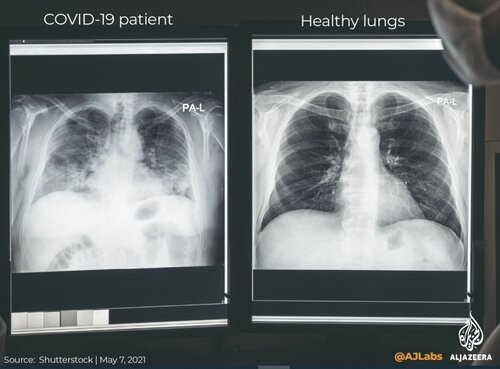
"... A blood oxygen saturation level (SpO2) above 95 percent is a healthy range for children and adults. Oxygen saturation levels below 90 percent are considered dangerous. According to the World Health Organisation (WHO), about 20 percent of COVID patients will require oxygen therapy to prevent respiratory failure.
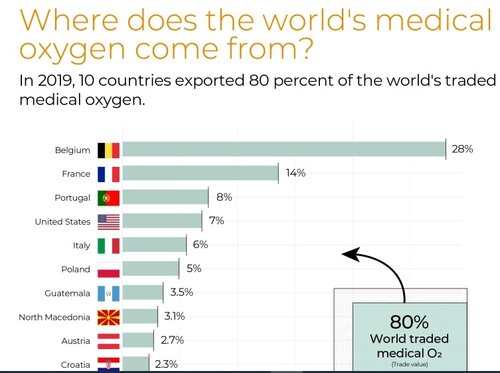
Source: World Bank 2019
How is medical oxygen produced?
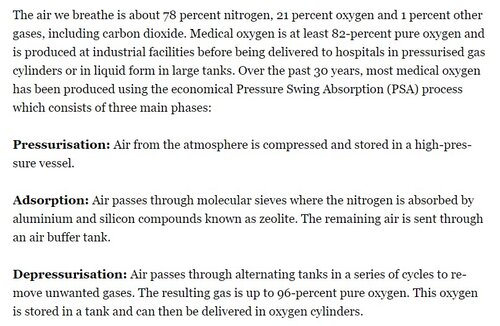
https://www.aljazeera.com/news/2021/5/11/covid-19-why-how-and-when-is-medical-oxygen-used
11 May 2021

"... A blood oxygen saturation level (SpO2) above 95 percent is a healthy range for children and adults. Oxygen saturation levels below 90 percent are considered dangerous. According to the World Health Organisation (WHO), about 20 percent of COVID patients will require oxygen therapy to prevent respiratory failure.

Source: World Bank 2019
How is medical oxygen produced?

From June you can get to the Maldives – which plans Covid-19 shots for tourists – in 9 hours
https://www.businessinsider.co.za/vaccine-tourism-from-south-african-may-open-to-the-maldives-2021-4
Dis seker ook al hoe ek 'n steek kan kry in die Maldives
https://www.businessinsider.co.za/vaccine-tourism-from-south-african-may-open-to-the-maldives-2021-4
Dis seker ook al hoe ek 'n steek kan kry in die Maldives
Covid vaccines do not harm placenta, contrary to social media misinformation, study finds
https://edition.cnn.com/2021/05/11/health/covid-vaccines-placenta-misinformation/index.html
11 May 2021
... "There's no theoretical reason to believe these vaccines would be harmful," Dr. Richard Beigi, who sits on the Immunization, Infectious Disease, and Public Health Preparedness Expert Work Group of the American College of Obstetricians and Gynecologists. "There's never been any vaccine that's been linked with infertility," he said...
In a new study published Tuesday, Miller [Dr. Emily Miller, assistant professor of obstetrics and gynecology at Northwestern Medicine] and her team at Northwestern confirmed that Covid-19 vaccines do not harm the placenta and affect pregnancy adversely as a result...
Miller and Goldstein examined placentas from 84 vaccinated women and 116 unvaccinated women who gave birth at one hospital in Chicago. In addition to looking for abnormalities, the team also searched for evidence of abnormal blood flow, which had been previously reported in pregnant patients who have tested positive for Covid-19.
The authors saw "no increased incidence" of blood flow issues or placental lesions or malformations in the women who had the vaccine versus those who did not.
Known risks of Covid-19
The risks of Covid-19 infection for pregnant women include serious reactions, even death, and an increased risk of preterm delivery for their babies, according to the US Centers for Disease Control and Prevention.
A recent study of pregnant women with a Covid-19 diagnosis from 18 different countries found they were at higher risk for adverse outcomes such as preeclampsia, infections, admission to hospital intensive care units and death.
The risk of death for pregnant women with Covid-19 was 1.6%, which was 22 times higher than pregnant women who were not infected, according to the study.
Babies born to mothers infected with the novel coronavirus were also at somewhat higher risk of preterm birth and low birth weight, the study found...
Benefits for the baby too
An earlier study by Miller and Goldstein published in April found pregnant women vaccinated against Covid-19 successfully make and transfer antibodies to their growing babies.
In fact, women who were vaccinated early in their third trimester had a better chance of passing protective antibodies to their newborns than women who were vaccinated closer to their delivery date..."
https://edition.cnn.com/2021/05/11/health/covid-vaccines-placenta-misinformation/index.html
11 May 2021
... "There's no theoretical reason to believe these vaccines would be harmful," Dr. Richard Beigi, who sits on the Immunization, Infectious Disease, and Public Health Preparedness Expert Work Group of the American College of Obstetricians and Gynecologists. "There's never been any vaccine that's been linked with infertility," he said...
In a new study published Tuesday, Miller [Dr. Emily Miller, assistant professor of obstetrics and gynecology at Northwestern Medicine] and her team at Northwestern confirmed that Covid-19 vaccines do not harm the placenta and affect pregnancy adversely as a result...
Miller and Goldstein examined placentas from 84 vaccinated women and 116 unvaccinated women who gave birth at one hospital in Chicago. In addition to looking for abnormalities, the team also searched for evidence of abnormal blood flow, which had been previously reported in pregnant patients who have tested positive for Covid-19.
The authors saw "no increased incidence" of blood flow issues or placental lesions or malformations in the women who had the vaccine versus those who did not.
Known risks of Covid-19
The risks of Covid-19 infection for pregnant women include serious reactions, even death, and an increased risk of preterm delivery for their babies, according to the US Centers for Disease Control and Prevention.
A recent study of pregnant women with a Covid-19 diagnosis from 18 different countries found they were at higher risk for adverse outcomes such as preeclampsia, infections, admission to hospital intensive care units and death.
The risk of death for pregnant women with Covid-19 was 1.6%, which was 22 times higher than pregnant women who were not infected, according to the study.
Babies born to mothers infected with the novel coronavirus were also at somewhat higher risk of preterm birth and low birth weight, the study found...
Benefits for the baby too
An earlier study by Miller and Goldstein published in April found pregnant women vaccinated against Covid-19 successfully make and transfer antibodies to their growing babies.
In fact, women who were vaccinated early in their third trimester had a better chance of passing protective antibodies to their newborns than women who were vaccinated closer to their delivery date..."
WHO reviewing Seychelles data after fully vaccinated get COVID
https://www.aljazeera.com/news/2021...chelles-data-after-fully-vaccinated-get-covid
12 May 2021
"Country’s health ministry says a third of those diagnosed with COVID-19 in past week had had both doses of vaccine...
The WHO has said a large Phase III trial of Sinopharm has shown that two doses, administered at an interval of 21 days, have an efficacy of 79 percent against symptomatic infection, 14 or more days after the second dose. AstraZeneca said in March its COVID-19 vaccine was 76-percent effective...."
https://www.aljazeera.com/news/2021...chelles-data-after-fully-vaccinated-get-covid
12 May 2021
"Country’s health ministry says a third of those diagnosed with COVID-19 in past week had had both doses of vaccine...
The WHO has said a large Phase III trial of Sinopharm has shown that two doses, administered at an interval of 21 days, have an efficacy of 79 percent against symptomatic infection, 14 or more days after the second dose. AstraZeneca said in March its COVID-19 vaccine was 76-percent effective...."
To me, the greatest risk factor of the vaccines is that people will think that they are now immune and can't get the virus and will therefore not take precautions.
Likewise with those who have had the virus. It is assumed that they are now immune, but no-one knows for how long.
Likewise with those who have had the virus. It is assumed that they are now immune, but no-one knows for how long.
COVID-19: Experts call for stricter lockdown level as third wave looms
https://www.capetownetc.com/news/co...r-stricter-lockdown-level-as-third-wave-looms
11 May 2021
“In the absence of a mass vaccination rollout, experts have advised that tighter lockdown restrictions be implemented to avoid a vicious COVID-19 third wave propelled by new variants,” a News24 report said on Tuesday.
The Free State health department announced last week that the province was officially in the third wave of COVID-19, according to The Citizen.
“We are now in the third wave of the outbreak and have today [Friday, May 7] seen a shocking rise of infections, to 427 new cases, with 60 yet to be allocated to appropriate districts,” spokesperson Mondli Mvambi was quoted as saying.
Infection numbers doubling
Meanwhile, the Gauteng province also warned of an imminent third wave, as the rise of COVID-19 infections remained a concern for the provincial government, eNCA reported..."
The province had more than 4 000 active COVID-19 cases, and infection numbers were doubling weekly in some areas, the report said.
This came as the Health Department said two variants of concern had been detected in South Africa.
Reports over the weekend indicated that at least eight people in the Western Cape had tested positive for the COVID-19 variant first detected in the United Kingdom.
https://www.capetownetc.com/news/co...r-stricter-lockdown-level-as-third-wave-looms
11 May 2021
“In the absence of a mass vaccination rollout, experts have advised that tighter lockdown restrictions be implemented to avoid a vicious COVID-19 third wave propelled by new variants,” a News24 report said on Tuesday.
The Free State health department announced last week that the province was officially in the third wave of COVID-19, according to The Citizen.
“We are now in the third wave of the outbreak and have today [Friday, May 7] seen a shocking rise of infections, to 427 new cases, with 60 yet to be allocated to appropriate districts,” spokesperson Mondli Mvambi was quoted as saying.
Infection numbers doubling
Meanwhile, the Gauteng province also warned of an imminent third wave, as the rise of COVID-19 infections remained a concern for the provincial government, eNCA reported..."
The province had more than 4 000 active COVID-19 cases, and infection numbers were doubling weekly in some areas, the report said.
This came as the Health Department said two variants of concern had been detected in South Africa.
Reports over the weekend indicated that at least eight people in the Western Cape had tested positive for the COVID-19 variant first detected in the United Kingdom.
That last paragraph you wrote is what the media is failing to bring to people’s knowledge. The laymen hear 95%, 76% of efficacy but they don’t get the second part of the sentence which is efficacy against severe and lethal forms! I personally know 3 healthcare professionals who had both COVID-19 and were immunized then had a second episode of Covid-19 (luckily all 3 had very mild forms the second time).WHO reviewing Seychelles data after fully vaccinated get COVID
https://www.aljazeera.com/news/2021...chelles-data-after-fully-vaccinated-get-covid
12 May 2021
"Country’s health ministry says a third of those diagnosed with COVID-19 in past week had had both doses of vaccine...
The WHO has said a large Phase III trial of Sinopharm has shown that two doses, administered at an interval of 21 days, have an efficacy of 79 percent against symptomatic infection, 14 or more days after the second dose. AstraZeneca said in March its COVID-19 vaccine was 76-percent effective...."
So yes, people look at what is happening in England at a country level and think they can apply it to their little selves.
That last paragraph you wrote is what the media is failing to bring to people’s knowledge. The laymen hear 95%, 76% of efficacy but they don’t get the second part of the sentence which is efficacy against severe and lethal forms! I personally know 3 healthcare professionals who had both COVID-19 and were immunized then had a second episode of Covid-19 (luckily all 3 had very mild forms the second time).
So yes, people look at what is happening in England at a country level and think they can apply it to their little selves.
Bottom line as I stated way earlier, it's here to stay, in what form is entirely up to us, it will become endemic.
It will become endemic/seasonal like any other flu virus...Bottom line as I stated way earlier, it's here to stay, in what form is entirely up to us, it will become endemic.
South Africa’s most vaccine-hesitant people speak Afrikaans, a new study says
https://www.businessinsider.co.za/s...eople-speak-afrikaans-a-new-study-says-2021-5
12 May 2021
The NIDS-CRAM Wave 4 survey, conducted between 2 February and 10 March 2021, has identified hesitancy rates according to age, gender, population group, home language, geography, and level of education.
Among the 29% of respondents who are vaccine hesitant, almost a third cited concerns about the jab's side-effects as a primary reason for being wary. Just over 20% of vaccine hesitant respondents worried about the vaccine’s effectiveness, and 18% reported "being against vaccines in general."
Other concerns include uncertainty about the safety of the vaccine (14%), lack of trust in government (2%), affordability, and time (both 1%).
Of all the age groups surveyed, 37% of respondents aged between 18 and 24 said they were hesitant to get vaccinated against Covid-19, significantly higher than the national average of 29%.
Respondents over the age of 60 are most willing to be vaccinated (72.8%).
And while the NIDS-CRAM study found no clear correlation between hesitancy or willingness rates and socioeconomic status, evidence points to levels of education playing a role in the acceptance of vaccines. Respondents with only primary schooling are more likely to be vaccine hesitant, while more than 75% of those with a tertiary education indicated that they are willing to take the jab.
Other statistically significant differences were recorded among diverse population groups and home language speakers, where coloured and Afrikaans-speaking South Africans ranked as the most vaccine hesitant, respectively.
"We find that 42% of Afrikaans home language respondents were vaccine hesitant, much higher than the national average [29%] and if we use a 90% significance threshold, the mean for Afrikaans speakers are significantly higher than 7 of the 11 language groups," the Wave 4 presentation notes.
"Although NIDS-CRAM is not provincially representative, in light of the language results and the predominance of Afrikaans in the Western Cape and Northern Cape, it is also clear that respondents from these provinces had higher vaccine hesitancy on average."
Of the respondents with Sesotho as their home language, 35% indicated that they are vaccine hesitant. A third of all English respondents also indicated hesitancy.
Vaccine hesitancy rates among isiXhosa and isiZulu speakers matched, with a quarter of respondents indicating their wariness. Tshivenda speakers had the lowest hesitancy rates of just 18%.
"Taken together, these language and provincial results suggest that campaigns targeted at both of these provinces and at Afrikaans' home language speakers is supported by this data," adds NIDS-CRAM.
In terms of hesitancy rates among different population groups, NIDS-CRAM found that black South Africans were most willing (73%) to be vaccinated against Covid-19, while coloured South Africans were the most hesitant, with just 57.6% of respondents indicating their willingness..."
Just under 61% of Indian and Asian respondents indicated that they were willing to receive their jabs. Of all white respondents, 65% indicated they would accept a Covid-19 vaccine if it were available.
https://www.businessinsider.co.za/s...eople-speak-afrikaans-a-new-study-says-2021-5
12 May 2021
- The latest NIDS-CRAM survey shows that 29% of South Africans are hesitant about getting Covid-19 jabs.
- Hesitancy rates are generally down from previous reports.
- More than a third of respondents aged between 18 and 24 said they were hesitant to get a Covid-19 vaccine.
- And fewer than 60% of Afrikaans-speaking respondents indicated their willingness to be innoculated, especially in the Northern and Western Cape.
The NIDS-CRAM Wave 4 survey, conducted between 2 February and 10 March 2021, has identified hesitancy rates according to age, gender, population group, home language, geography, and level of education.
Among the 29% of respondents who are vaccine hesitant, almost a third cited concerns about the jab's side-effects as a primary reason for being wary. Just over 20% of vaccine hesitant respondents worried about the vaccine’s effectiveness, and 18% reported "being against vaccines in general."
Other concerns include uncertainty about the safety of the vaccine (14%), lack of trust in government (2%), affordability, and time (both 1%).
Of all the age groups surveyed, 37% of respondents aged between 18 and 24 said they were hesitant to get vaccinated against Covid-19, significantly higher than the national average of 29%.
Respondents over the age of 60 are most willing to be vaccinated (72.8%).
And while the NIDS-CRAM study found no clear correlation between hesitancy or willingness rates and socioeconomic status, evidence points to levels of education playing a role in the acceptance of vaccines. Respondents with only primary schooling are more likely to be vaccine hesitant, while more than 75% of those with a tertiary education indicated that they are willing to take the jab.
Other statistically significant differences were recorded among diverse population groups and home language speakers, where coloured and Afrikaans-speaking South Africans ranked as the most vaccine hesitant, respectively.
"We find that 42% of Afrikaans home language respondents were vaccine hesitant, much higher than the national average [29%] and if we use a 90% significance threshold, the mean for Afrikaans speakers are significantly higher than 7 of the 11 language groups," the Wave 4 presentation notes.
"Although NIDS-CRAM is not provincially representative, in light of the language results and the predominance of Afrikaans in the Western Cape and Northern Cape, it is also clear that respondents from these provinces had higher vaccine hesitancy on average."
Of the respondents with Sesotho as their home language, 35% indicated that they are vaccine hesitant. A third of all English respondents also indicated hesitancy.
Vaccine hesitancy rates among isiXhosa and isiZulu speakers matched, with a quarter of respondents indicating their wariness. Tshivenda speakers had the lowest hesitancy rates of just 18%.
"Taken together, these language and provincial results suggest that campaigns targeted at both of these provinces and at Afrikaans' home language speakers is supported by this data," adds NIDS-CRAM.
In terms of hesitancy rates among different population groups, NIDS-CRAM found that black South Africans were most willing (73%) to be vaccinated against Covid-19, while coloured South Africans were the most hesitant, with just 57.6% of respondents indicating their willingness..."
Just under 61% of Indian and Asian respondents indicated that they were willing to receive their jabs. Of all white respondents, 65% indicated they would accept a Covid-19 vaccine if it were available.
South Africa’s most vaccine-hesitant people speak Afrikaans, a new study says
https://www.businessinsider.co.za/s...eople-speak-afrikaans-a-new-study-says-2021-5
12 May 2021
The majority of South Africans are increasingly eager to receive their jabs, suggests the latest NIDS-CRAM survey, which asked more than 5,600 interviewees if they would get a Covid-19 vaccination. More than half of the respondents (55%) "strongly agreed" to receiving the vaccine, while 16% "somewhat agreed"...
- The latest NIDS-CRAM survey shows that 29% of South Africans are hesitant about getting Covid-19 jabs.
- Hesitancy rates are generally down from previous reports.
- More than a third of respondents aged between 18 and 24 said they were hesitant to get a Covid-19 vaccine.
- And fewer than 60% of Afrikaans-speaking respondents indicated their willingness to be innoculated, especially in the Northern and Western Cape.
The NIDS-CRAM Wave 4 survey, conducted between 2 February and 10 March 2021, has identified hesitancy rates according to age, gender, population group, home language, geography, and level of education.
Among the 29% of respondents who are vaccine hesitant, almost a third cited concerns about the jab's side-effects as a primary reason for being wary. Just over 20% of vaccine hesitant respondents worried about the vaccine’s effectiveness, and 18% reported "being against vaccines in general."
Other concerns include uncertainty about the safety of the vaccine (14%), lack of trust in government (2%), affordability, and time (both 1%).
Of all the age groups surveyed, 37% of respondents aged between 18 and 24 said they were hesitant to get vaccinated against Covid-19, significantly higher than the national average of 29%.
Respondents over the age of 60 are most willing to be vaccinated (72.8%).
And while the NIDS-CRAM study found no clear correlation between hesitancy or willingness rates and socioeconomic status, evidence points to levels of education playing a role in the acceptance of vaccines. Respondents with only primary schooling are more likely to be vaccine hesitant, while more than 75% of those with a tertiary education indicated that they are willing to take the jab.
Other statistically significant differences were recorded among diverse population groups and home language speakers, where coloured and Afrikaans-speaking South Africans ranked as the most vaccine hesitant, respectively.
"We find that 42% of Afrikaans home language respondents were vaccine hesitant, much higher than the national average [29%] and if we use a 90% significance threshold, the mean for Afrikaans speakers are significantly higher than 7 of the 11 language groups," the Wave 4 presentation notes.
"Although NIDS-CRAM is not provincially representative, in light of the language results and the predominance of Afrikaans in the Western Cape and Northern Cape, it is also clear that respondents from these provinces had higher vaccine hesitancy on average."
Of the respondents with Sesotho as their home language, 35% indicated that they are vaccine hesitant. A third of all English respondents also indicated hesitancy.
Vaccine hesitancy rates among isiXhosa and isiZulu speakers matched, with a quarter of respondents indicating their wariness. Tshivenda speakers had the lowest hesitancy rates of just 18%.
"Taken together, these language and provincial results suggest that campaigns targeted at both of these provinces and at Afrikaans' home language speakers is supported by this data," adds NIDS-CRAM.
In terms of hesitancy rates among different population groups, NIDS-CRAM found that black South Africans were most willing (73%) to be vaccinated against Covid-19, while coloured South Africans were the most hesitant, with just 57.6% of respondents indicating their willingness..."
Just under 61% of Indian and Asian respondents indicated that they were willing to receive their jabs. Of all white respondents, 65% indicated they would accept a Covid-19 vaccine if it were available.
I'm not the slightest bit surprised. Just go look at the comments on any maroela media article.
Ons Afrikaaners is ge'f.
Where to get a Covid-19 vaccine in Johannesburg, Cape Town, and Durban
https://www.businessinsider.co.za/where-can-i-get-a-covid19-vaccine-in-south-africa-2021-5-2
13 May 2021
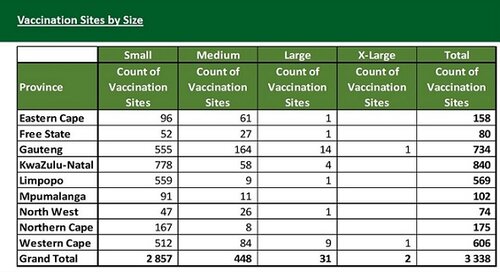
Johannesburg
Cape Town
Durban
https://www.businessinsider.co.za/where-can-i-get-a-covid19-vaccine-in-south-africa-2021-5-2
13 May 2021
- Phase 2 of South Africa’s vaccine rollout, targeting people over the age of 60, will begin on 17 May.
- The health department is set to release details of more than 3,000 vaccination sites which will be used in Phase 2 and 3 of the rollout.
- Phase 1, which focuses on frontline healthcare workers, currently includes 92 vaccination sites.
- Healthcare workers and senior citizens are urged to register for their jabs.
- They'll be allocated a time and location slot according to their work or home addresses...

Johannesburg
- Charlotte Maxeke Hospital (Parktown, Johannesburg)
- Helen Joseph Hospital (Rossmore, Johannesburg)
- Mediclinic Medforum Hospital (412 Francis Baard St, Arcadia, Pretoria)
- NHN Lenmed Ahmed Kathrada Private Hospital (K43 Klipspruit West Lenasia, Soweto)
- Chris Hani Baragwanath Hospital (26 Chris Hani Rd, Diepkloof 319-Iq, Johannesburg)
- Netcare Milpark Hospital (9 Guild Rd, Parktown, Johannesburg)
- Dr George Mukhari Hospital (3111 Setlogelo Drive, Ga-Rankuwa Unit 2, Ga-Rankuwa)
Cape Town
- Mitchells Plain Hospital (8 AZ Berman Drive, Lentegeur, Cape Town)
- Caledon Hospital
- George Hospital (King George Park Corner of Davidson and Langenhoven Rd)
- Worcester Hospital (Murray St, Worcester)
- Paarl Hospital (10 Hospital St, Lemoenkloof, Paarl)
- Melomed Gatesville (Clinic St, Gatesville, Cape Town)
- Tygerberg Hospital (Francie Van Zijl Dr, Avenue, Cape Town)
- Khayelitsha Hospital (Walter Sisulu Drive and Steve Biko Drive, Mandela Park, Khayelitsha)
- Groote Schuur Hospital (Main Rd, Observatory, Cape Town)
Durban
- Netcare St Augustine's Hospital (107 J.B. Marks Rd, Bulwer, Berea)
- Christ the King Hospital (Ixopo)
- Hlabisa Hospital (60 Saunders St, Nongoma)
- Ngwelezane Hospital (Thanduyise Dr, Kuleka, Empangeni)
- Vryheid Hospital (Coswald Brown St, Vryheid)
- Dundee Hospital (121 Mckenzie St, Dundee)
- Mediclinic Pietermaritzburg Hospital (90 Payn St, Pietermaritzburg)
- Ladysmith Hospital (36 A Malcolm Road, Ladysmith)
"Just think of this..."
Similar threads
- Replies
- 1
- Views
- 58
- Replies
- 0
- Views
- 52
- Replies
- 0
- Views
- 38
- Replies
- 2
- Views
- 50


